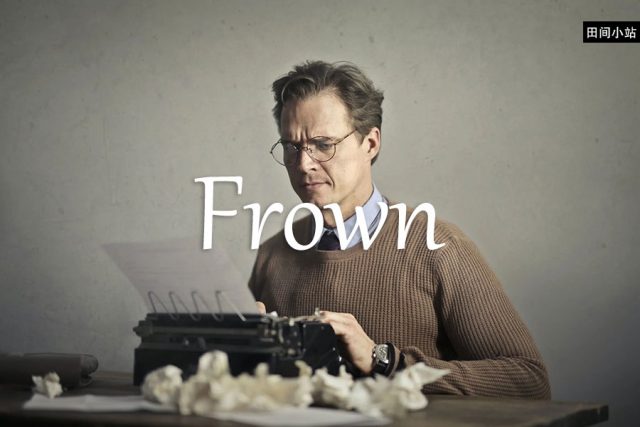本文经授权转载自微信公众号:田间小站

考研 CET4 IELTS TOEFL TEM4 TEM8
外刊例句
- When a shopper walked to the end of an aisle only to return with a frown to a bookshelf, the software discreetly messaged clerks, who went to help.
当顾客走到过道尽头,却又皱着眉头回到书架旁,软件就会悄悄向店员发出消息,店员就会上前帮忙。
——《经济学人》 - They show no emotions: They do not cry or smile or frown, but simply gaze blankly, their bodies unwilling to waste a calorie on emotion when every iota of energy must go to keep major organs functioning.
从他们脸上看不到任何情绪:不哭,不笑,也没有皱眉,只有面无表情地凝视,他们的身体不愿意在情绪上浪费哪怕一个卡路里,每一份能量都必须用来维持体内主要器官的运转。
——《纽约时报》
基本释义
[verb] furrow one's brows in an expression indicating disapproval, displeasure, or concentration
[动词] 皱眉表示不赞成、不高兴或全神贯注
深入解读
Frown 一词于14世纪末期由古法语 frognier (皱眉、怒视、哼鼻子、嗤之以鼻)进入英语,即用来表示“皱眉、蹙(cù)额”,主要指通过紧皱眉头来作出严肃、愤怒、失望、担忧、不高兴、蔑视或全神贯注的表情,既可以用作动词,也可以用作名词,比如:
- 他令她动心,让她着迷。看到他皱起眉头,她赶紧解释。
He drew and enthralled her. She saw his frown and hastened to explain. - 服务员皱了皱眉头,突然警惕起来。然后她改变了站姿,把重心从一只脚移到另一只脚。
The attendant frowned, suddenly wary. Then she shifted her stance from one foot to another.
从这个概念出发,还常用动词短语 frown on/upon sb/sth 表示“不赞成、不同意、不许可”,比如:
- 许多教师不赞同这种大胆的做法。
Many teachers frown on such audacious practices.
名著用例
On her flower frowning miss Douce said:
杜丝小姐朝自己的花皱了皱眉,说:
—Most aggravating that young brat is. If he doesn't conduct himself I'll wring his ear for him a yard long.
“那个小子太放肆啦。他要是不放规矩些,我就把他的耳朵扯到一码长。”
出自爱尔兰现代主义作家詹姆斯·乔伊斯(James Joyce)于1922年出版的长篇小说《尤利西斯》(Ulysses)。参见:名著下载 | 尤利西斯(Ulysses)
同近义词
- scowl: frown in an angry or bad-tempered way
- glower: have an angry or sullen look on one's face; scowl
- glare: stare in an angry or fierce way
